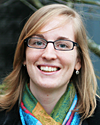Overview
At the Bottom Billions/Bottom Line conference held April 1–2, 2011, attendees heard inspiring stories, discovered innovative business models, and explored challenges in creating social and financial value.
Who Are the Bottom Billions?
Approximately 1 billion people live on less than $1 per day, with the next 3 billion surviving on less than $4 each day. Research indicates that as many as 60 nations have seen little to no income growth since the 1980s. That’s two-thirds of global citizens who struggle to survive on pocket change — and trillions spent on aid programs have had only a limited impact.
What Is the Bottom Line?
Business at its core — the mutually beneficial exchange of goods and services — provides a fundamental foundation on which human flourishing depends. And a well-run business delivers more than profits — it delivers well-being for people.
The fight to alleviate global poverty isn’t just for nonprofits and governments. With its unique capacity to create innovative, profitable, and scalable solutions, for-profit businesses — regardless of their size, structure, and industry — are also a force that can bring lasting change.
Who Attended This Conference?
Business Leaders who
- Understand that “doing well” and “doing good” are not mutually exclusive
- Realize that all business is now global, and thereby, global poverty is everyone’s issue
Employees and Intrapreneurs who
- Are aware of sustainability, CSR, and citizenship and want to know how these intersect with global poverty
- Seek to affect change for the global poor by changing how their own company operates
Consumers who
- Wonder how to use their buying power toward doing good in the world
- Seek authenticity from the companies with which they do business
Social Entrepreneurs (for-profit and nonprofit) who
- Face the challenges of effectively structuring and/or capitalizing a social enterprise
- Do for-profit business in (or from) developing-country markets
Bottom Billions/Bottom Line Leadership Team
 Jeff Keenan spent more than 20 years in global supply-chain management for Aldus Corp. and Adobe Systems, where he was responsible for the supply-chain product launch milestones of all Adobe product lines in 20 languages. Keenan also developed Adobe’s Supply Chain CSR program, and served as Adobe’s representative on the Electronic Industry Citizenship Coalition through Business for Social Responsibility. Keenan is an SPU alumnus, an advisory board member of Global Washington and InterConnection, and the co-author (w/Shannon Daley-Harris) of Our Day to End Poverty: 24 Ways You Can Make a Difference.
Jeff Keenan spent more than 20 years in global supply-chain management for Aldus Corp. and Adobe Systems, where he was responsible for the supply-chain product launch milestones of all Adobe product lines in 20 languages. Keenan also developed Adobe’s Supply Chain CSR program, and served as Adobe’s representative on the Electronic Industry Citizenship Coalition through Business for Social Responsibility. Keenan is an SPU alumnus, an advisory board member of Global Washington and InterConnection, and the co-author (w/Shannon Daley-Harris) of Our Day to End Poverty: 24 Ways You Can Make a Difference.
 John Terrill is the director of SPU’s Center for Integrity in Business. Prior to SPU, he spent time in banking, organization development consulting, and 10 years with InterVarsity Christian Fellowship as the director for M.B.A. Ministry, as well as Professional Schools Ministries. Terrill has led multiple teams to the Central African Republic to help launch a microfinance program and co-directed the PNW Microfinance Conference at SPU in 2009, as well as the 1,200-person Open for Business (business-as-mission) Conference at the Urbana 2006 Missions Convention. Terrill is a regular contributor to Comment magazine and other print and web-based journals on matters related to business, ethics, and Christian theology.
John Terrill is the director of SPU’s Center for Integrity in Business. Prior to SPU, he spent time in banking, organization development consulting, and 10 years with InterVarsity Christian Fellowship as the director for M.B.A. Ministry, as well as Professional Schools Ministries. Terrill has led multiple teams to the Central African Republic to help launch a microfinance program and co-directed the PNW Microfinance Conference at SPU in 2009, as well as the 1,200-person Open for Business (business-as-mission) Conference at the Urbana 2006 Missions Convention. Terrill is a regular contributor to Comment magazine and other print and web-based journals on matters related to business, ethics, and Christian theology.
 Kenman Wong serves as a professor in the School of Business and Economics at SPU, where he teaches courses on business ethics, microfinance, and business and global poverty (in development). He also provides leadership for co-curricular initiatives related to the role of business in creating economic and social value, including service as co-chair of the 2009 Pacific Northwest Microfinance Conference. Wong is the author or co-author of three books, including the recent Business for the Common Good (with Scott Rae; Intervarsity Press Academic, 2011). Wong has won awards for excellence in teaching, scholarship, and community outreach.
Kenman Wong serves as a professor in the School of Business and Economics at SPU, where he teaches courses on business ethics, microfinance, and business and global poverty (in development). He also provides leadership for co-curricular initiatives related to the role of business in creating economic and social value, including service as co-chair of the 2009 Pacific Northwest Microfinance Conference. Wong is the author or co-author of three books, including the recent Business for the Common Good (with Scott Rae; Intervarsity Press Academic, 2011). Wong has won awards for excellence in teaching, scholarship, and community outreach.
 Kristy Guertin is an SPU senior studying global development. While traveling in Southeast Asia, Guertin witnessed the poverty of the “bottom billions,” which led her to pursue an education that will allow her to help build the capacities of the poor. A microfinance course taught by Professor Kenman Wong sparked her interest in business as a means of improving the lives of those in poverty, and participation in SPU’s Social Venture Plan Competition enhanced her interest in the power of business as a viable approach to improve living standards in developing countries. Guertin hopes to use her studies in Arabic as she pursues a career in development.
Kristy Guertin is an SPU senior studying global development. While traveling in Southeast Asia, Guertin witnessed the poverty of the “bottom billions,” which led her to pursue an education that will allow her to help build the capacities of the poor. A microfinance course taught by Professor Kenman Wong sparked her interest in business as a means of improving the lives of those in poverty, and participation in SPU’s Social Venture Plan Competition enhanced her interest in the power of business as a viable approach to improve living standards in developing countries. Guertin hopes to use her studies in Arabic as she pursues a career in development.
 Anna Veldt is an SPU senior studying international business and social enterprise. Throughout her college career, Veldt has traveled to various countries, including China, Spain, and Argentina (where she spent six months studying economics). In March 2011, she plans to travel to El Salvador with Agros International, a Seattle-based NGO that Veldt works for as a part-time international service teams assistant. After graduation in June 2011, Veldt says she will continue her involvement in business, development, and poverty alleviation.
Anna Veldt is an SPU senior studying international business and social enterprise. Throughout her college career, Veldt has traveled to various countries, including China, Spain, and Argentina (where she spent six months studying economics). In March 2011, she plans to travel to El Salvador with Agros International, a Seattle-based NGO that Veldt works for as a part-time international service teams assistant. After graduation in June 2011, Veldt says she will continue her involvement in business, development, and poverty alleviation.
 Tim Weinhold is an experienced businessman with a passion for creating business solutions to chronic poverty. He has co-founded several businesses, including a venture capital-funded computer graphics company, a highly regarded Christian mutual fund and, most recently, a business providing non-medical homecare to the elderly. Weinhold travels extensively in the developing world, especially in Southeast Asia and South America, where he focuses on micro/SME entrepreneurial training and economic development.
Tim Weinhold is an experienced businessman with a passion for creating business solutions to chronic poverty. He has co-founded several businesses, including a venture capital-funded computer graphics company, a highly regarded Christian mutual fund and, most recently, a business providing non-medical homecare to the elderly. Weinhold travels extensively in the developing world, especially in Southeast Asia and South America, where he focuses on micro/SME entrepreneurial training and economic development.
“We can make market forces work better for the poor if we can develop a more creative capitalism — if we can stretch the reach of market forces so that more people can make a profit or at least make a living, serving people who are suffering from the great inequities.”
Bill Gates, co-founder of the Bill & Melinda Gates Foundation
“I believe there is no better way to combine your desire for a better world with effectiveness than through a company."
Muhammad Yunus, founder of Grameen Bank
Steering Committee
Roger Bairstow
Broetje Orchards
Rashmir Balasubrama
iScale
Kathleen Braden
Seattle Pacific University
Scott Cummins
Consultant
Bookda Gheisar
Global Washington
Brian Howe
Vox Legal
Chris Megargee
Global Partnerships
Susan Talbot
World Concern
Craig Wainscott
The Paradigm Project
Chris Wolff
Accion
